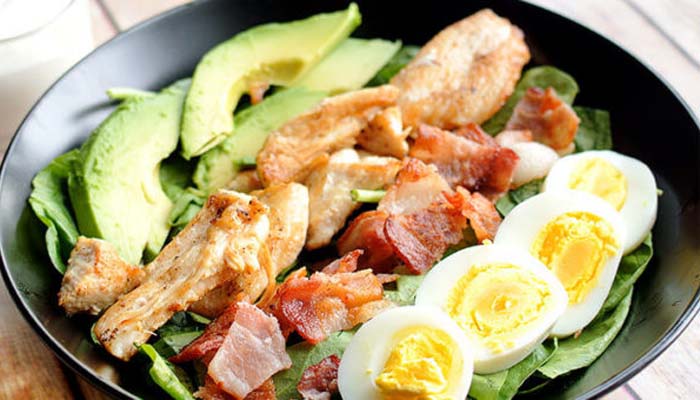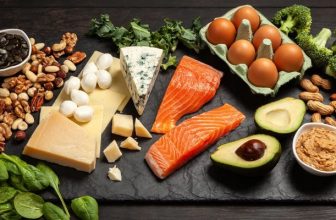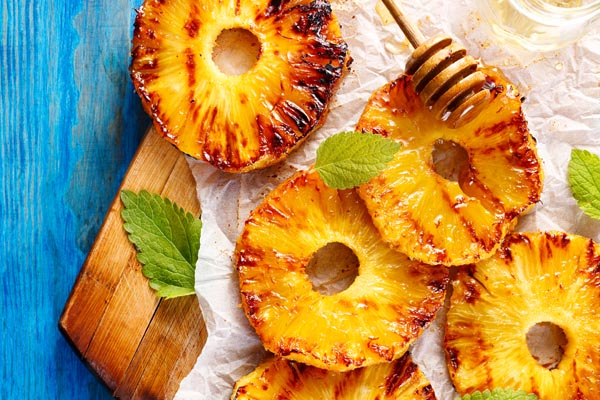
One of the latest diet trends seems like a dream come true: the high-fat, low-carb ketogenic (or “keto”) diet. The premise is fairly simple. According to many hardcore keto dieters, all you have to do is eat high-fat, moderate protein, and low-carb foods, and you’ll drop pounds effortlessly. So, you get to eat all the cheese and bacon you want, right? Not quite. There are countless myths about keto diets, so here are a few common beliefs to help you separate fact from fiction.
1. The Keto Diet Is Bad for Your Heart
Many people believe that eating a high-fat diet like the keto diet can increase your risk of developing heart disease. Fortunately, research indicates that this is not the case. Several studies support the idea that eating saturated fat doesn’t have a significant impact on heart disease risk. In fact, the low-carb requirement of the keto diet may actually support a healthy heart by lowering blood pressure, decreasing inflammation, and increasing good cholesterol.
2. The Keto Diet Is Good for Your Brain
This one actually has quite a bit of truth to it. Research shows that a ketogenic diet can be a safe and effective treatment for people with epilepsy. Although scientists aren’t precisely sure why it works, several studies have shown that epileptic persons eating a keto diet experienced fewer seizures than their peers who ate a standard diet. In fact, this way of eating has been used as an epilepsy treatment for over 100 years, particularly in kids with the condition.
Other research suggests that eating high-fat/low-carb may also support higher levels of mental performance. Scientists speculate that the keto diet may be beneficial as a treatment for other mental disorders, such as Alzheimer’s or Parkinson’s disease, though more research is necessary to investigate this hypothesis.
3. The Keto Diet Is the Best Diet for Weight Loss
The ketogenic diet is often touted as a fast-track to weight loss. Many anecdotal stories seem to support this, as countless celebrities and social media influencers share their miraculous keto dieting stories. Although it is true that people following a keto diet frequently lose weight rapidly at first, the difference in weight loss over time between those eating keto and those eating other diets (such as a traditional low-fat diet or a Mediterranean diet) is slim.
4. The Keto Diet Is Hard to Follow
As with any diet, it’s hard to determine how easy or hard a ketogenic diet is to stick with over the long term, because this depends largely on the individual. Some people may find that eating keto fits their lifestyle well, and because it makes them feel so good, they rarely desire to stray from it. However, others might not have the same level of motivation and thus find it more challenging to stick with the program.
5. The Keto Diet Skimps on Fruits and Vegetables
The keto diet may limit carbohydrates, but the protocol encourages the consumption of low-carb veggies such as broccoli, cauliflower, leafy greens, zucchini, cucumbers, and peppers. The diet also allows for small portions of low-carb fruits, including avocado, tomatoes, strawberries, blueberries, and raspberries. Because of the high-fat/moderate protein portion of the diet, adequate amounts of approved fruits and vegetables are necessary to ensure sufficient intake of essential vitamins, minerals, and fiber — all of which are important for overall health and good digestion.
6. The Keto Diet Is the Same as the Atkins Diet
Both the keto and the Atkins diet are low-carb, but they moderate carbohydrates and protein differently. The keto diet generally allows for 20 to 50 grams of net carbohydrates daily, while the Atkins diet allows for 20 to 25 grams of carbs in the initial phase, then gradually increases them to 100 grams over the course of the plan. As for protein, the Atkins diet allows an unlimited amount, while the keto diet limits it to around 20% of total calorie intake.
7. The Keto Diet Lets You Eat as Much Fat as You Want
While the keto diet is certainly a high-fat diet (encouraging dieters to consume 75% of their calories in the form of fat), it doesn’t give you the freedom to eat unlimited bacon and butter. In fact, the keto diet recommends prioritizing unsaturated fats such as avocado, olive oil, fish, nuts, and seeds. Bacon and butter certainly have their place in a keto eating plan, but they should take a backseat to other fats.
The ketogenic diet is an exciting diet plan with promising results. A multitude of benefits can be gained from following it, such as rapid weight loss, improved heart health, and potential brain-protective benefits. As with any diet plan, be sure to talk with your doctor to see if a ketogenic diet might be a good fit for you.




